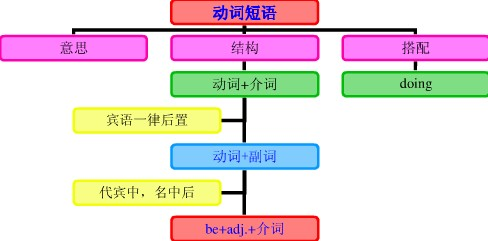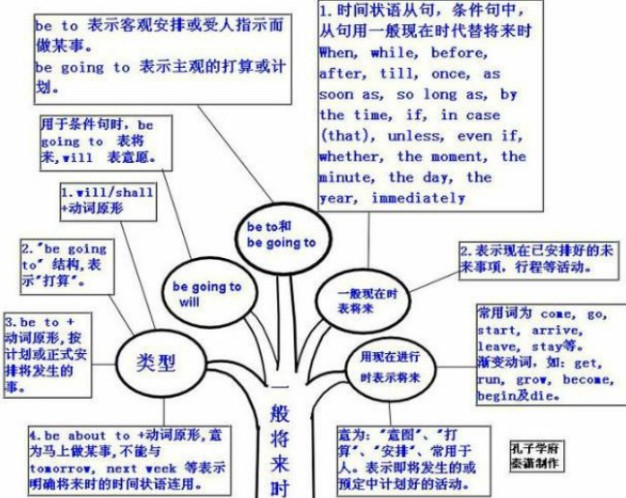本试题 “In such a fierce competition, a person has to make every effort if he________.[ ]A. has succeededB. is to succeedC. would succeedD. will succeed” 主要考查您对动词短语
一般将来时
等考点的理解。关于这些考点您可以点击下面的选项卡查看详细档案。
- 动词短语
- 一般将来时
动词短语的概念:
动词常和某些其他词类用在一起,构成固定词组,形成所谓短语动词(phrasalverb)。和动词一样,短语动词也可分为及物和不及物两种。短语动词可以作为一个整体看待,同一般动词一样使用。
动词短语的搭配类型:
1)动词+介词:这类短语动词用作及物动词,后面须跟宾语。
如:The small boy insisted on going with his parents. 那男孩坚持要跟父母一起去。
Do you often listen to broadcasts in English? 你常听英语广播吗?
Look at the children. Aren't they lovely? 看着这些孩子们。他们多么可爱呀!
We stand for self-reliance. 我们是主张自力更生的。
这一类的短语动词还有很多,如depend on(upon)(依靠),wait on(服侍),look for(寻找),deal with(对待),look after(照料),wait for(等待)等。
2)动词+副词:
这类短语动词有的用作及物动词,有的用作不及物动词。
如:I always get up as soon as the bell rings. 我总是一打铃就起床。(不及物)
Look out, there's a car coming! 当心,来汽车了!(不及物)
Have you handed in your exercises already? 你已经交练习了吗?(及物)
Please don't forget to put on your coat, it's cold outside. 请不要忘记穿外衣,外面很冷。(及物)
这一类的短语动词还有很多,及物如put out(扑灭),eat up(吃光),put down(放下);不及物如set off(出发),come up(走近),go on(继续)。
注:"动词+副词"这类短语动词和上面第一类"动词+介词"的不同之处在于:"动词+介词"用作及物动词,后面须跟宾语。"动词+副词"则有的及物,有的不及物;用作及物动词而宾语为人称代词或自身代词时,副词往往放在宾语之后。
如:Please wake me up at five tomorrow. 请在明天早上五点唤醒我。
If you have done your exercises, please hand them in. 如果你们练习做完了请交来。
She doesn't normally behave like that, she's putting it on. 她通常并不如此表现,她是装出来的。
注:这类短语动词有不少可兼作及物和不及物动词用。
如:He took off his hat when he entered the office. 他进办公室后脱下帽子。(及物)
The plane took off at seven sharp. 飞机在七点整起飞。(不及物)
Charlie rang up Neil to ask about the time of the meeting. 查理打电话给尼尔问开会的时间。(及物)
If you can't come, please ring up and let us know. 你如来不了,请来电话告诉我们一声。(不及物)
3)动词+副词+介词:
"动词+副词"之后有的可以再加一个介词,形成另一种短语动词。这类短语动词用作及物动词。
如:Do not give up hope. We must go on with the experiment 不要失望。我们必须继续试验。(go on with继续)
He came up to me. 他走到我跟前。(come up to走近)
这类短语动词还有:look down upon(看不起),do away with(去掉),put up with(忍受)等。
4)动词+名词+介词:
这类短语动词也是及物的。
如:He shook hands with all the guests at the banquet. 他在宴会上和宾客一一握手。
Young pioneers often come to the Children's Palace to take part in after school activities.少先队员经常到少年宫来参加课外活动。
Pay attention to the temperature of the stored rice. 注意仓库里的稻谷的温度。
Her job is taking care of the babies. 她的工作是照顾婴儿。
这一类短语动词还有:put an end to(结束),take notice of(注意),catch hold of(抓住),lose sight of(看不见),make use of(利用)等。
动词短语知识体系:

一般将来时的概念:
一般将来时表示将来某一时刻的发生动作或状态,或将来某一段时间内经常的动作或状态。常与表示将来的时间状语连用。
一般将来时用法:
1)shall用于第一人称,常被will所代替。will在陈述句中用于各人称,在征求意见时常用于第二人称。
例如:Which paragraph shall I read first?我先读哪一段呢?
Will you be at home at seven this evening? 今晚七点回家好吗?
2)be going to+不定式,表示将来。
a. 主语的意图,即将做某事。
例如:What are you going to do tomorrow? 明天打算作什么呢?
b. 计划,安排要发生的事。
例如:The play is going to be produced next month。这出戏下月开播。
c. 有迹象要发生的事。
例如:Look at the dark clouds, there is going to be a storm. 看那乌云,快要下雨了。
3)be+不定式表将来,按计划或正式安排将发生的事。
例如:We are to discuss the report next Saturday. 我们下星期六讨论这份报告。
4)be about to+不定式,意为马上做某事。
例如:He is about to leave for Beijing. 他马上要去北京。
注意:be about to do不能与tomorrow, next week 等表示明确将来时的时间状语连用。
一般将来时知识体系:

一般现在时表将来:
1)下列动词come, go, arrive, leave, start, begin, return的一般现在时可以表示将来,主要用来表示在时间上已确定或安排好的事情。
例如:The train leaves a tsix tomorrow morning. 火车明天上午六点开。
—When does the bus star? 汽车什么时候开?
—It stars in ten minutes. ?十分钟后。
2)以here, there等开始的倒装句,表示动作正在进行。
例如:Here comes the bus.=The bus is coming. 车来了。
There goes the bell.=The bell is ringing. 铃响了。
3)在时间或条件句中。
例如:When Bill comes(不是will come), ask him to wait for me. 比尔来后,让他等我。
I'll write to you as soon as I arrive there. 我到了那里,就写信给你。
4)在动词hope, take carethat,makesurethat等的宾语从句中。
例如:I hope they have a nice time next week. 我希望他们下星期玩得开心。
Make sure that the windows are closed before you leave the room. 离开房间前,务必把窗户关了。
现在进行时表示将来:
下列动词come, go, arrive, leave, start, begin, return等现在进行时可以表示将来。
例如:I'm leaving tomorrow. 明天我要走了。
Are you staying here till next week? 你会在这儿呆到下周吗?
与“In such a fierce competition, a person has to make every ...”考查相似的试题有:
- 改错题。Christie was one of my best friend at high school At that time, we often spend time together. Thank to her he...
- I didn’t like the story, ______ , it’s too long, also it was written by a writer I don’t knowA.for one thingB.for a...
- 32. It is certain that he will _____ his business to his son when he gets old.A.take overB.giveawayC.hand overD.w...
- Hank ____ his capable secretary by leaving most of the work to her and doing little himself.A.has advantage ofB.has...
- The American team will arrive in Paris to play a friendly match with a team that________ French andGerman selected pl...
- --I’m planning to visit your city next month.--If so, I can at my home.A.keep you upB.put you upC.pick you upD.ca...
- After a week their food ,and they had to return to their camp.[ ]A.gave upB.gave offC.gave outD.gave away
- Many parents died in Wenchuan earthquake,_____their children orphans.A.remainingB.keepingC.leavingD.letting
- His health ________ because his business broke up.[ ]A. broke outB. broke downC. broke offD. broke into
- The meeting we had ________ to _______ us finally.A.looked forward; disappointingB.been looked forward; disappointe...